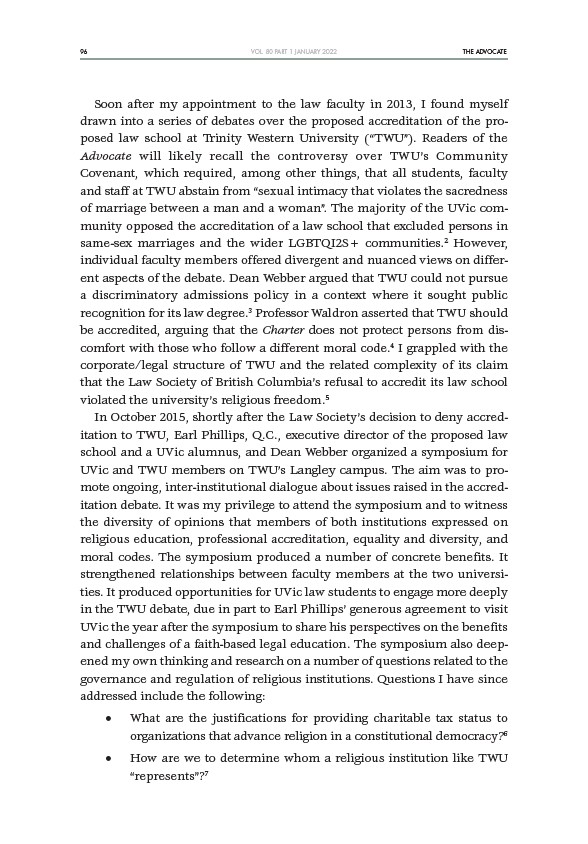
96 THE ADVOCATE
VOL. 80 PART 1 JANUARY 2022
Soon after my appointment to the law faculty in 2013, I found myself
drawn into a series of debates over the proposed accreditation of the proposed
law school at Trinity Western University (“TWU”). Readers of the
Advocate will likely recall the controversy over TWU’s Community
Covenant, which required, among other things, that all students, faculty
and staff at TWU abstain from “sexual intimacy that violates the sacredness
of marriage between a man and a woman”. The majority of the UVic community
opposed the accreditation of a law school that excluded persons in
same-sex marriages and the wider LGBTQI2S+ communities.2 However,
individual faculty members offered divergent and nuanced views on different
aspects of the debate. Dean Webber argued that TWU could not pursue
a discriminatory admissions policy in a context where it sought public
recognition for its law degree.3 Professor Waldron asserted that TWU should
be accredited, arguing that the Charter does not protect persons from discomfort
with those who follow a different moral code.4 I grappled with the
corporate/legal structure of TWU and the related complexity of its claim
that the Law Society of British Columbia’s refusal to accredit its law school
violated the university’s religious freedom.5
In October 2015, shortly after the Law Society’s decision to deny accreditation
to TWU, Earl Phillips, Q.C., executive director of the proposed law
school and a UVic alumnus, and Dean Webber organized a symposium for
UVic and TWU members on TWU’s Langley campus. The aim was to promote
ongoing, inter-institutional dialogue about issues raised in the accreditation
debate. It was my privilege to attend the symposium and to witness
the diversity of opinions that members of both institutions expressed on
religious education, professional accreditation, equality and diversity, and
moral codes. The symposium produced a number of concrete benefits. It
strengthened relationships between faculty members at the two universities.
It produced opportunities for UVic law students to engage more deeply
in the TWU debate, due in part to Earl Phillips’ generous agreement to visit
UVic the year after the symposium to share his perspectives on the benefits
and challenges of a faith-based legal education. The symposium also deepened
my own thinking and research on a number of questions related to the
governance and regulation of religious institutions. Questions I have since
addressed include the following:
• What are the justifications for providing charitable tax status to
organizations that advance religion in a constitutional democracy?6
• How are we to determine whom a religious institution like TWU
“represents”?7